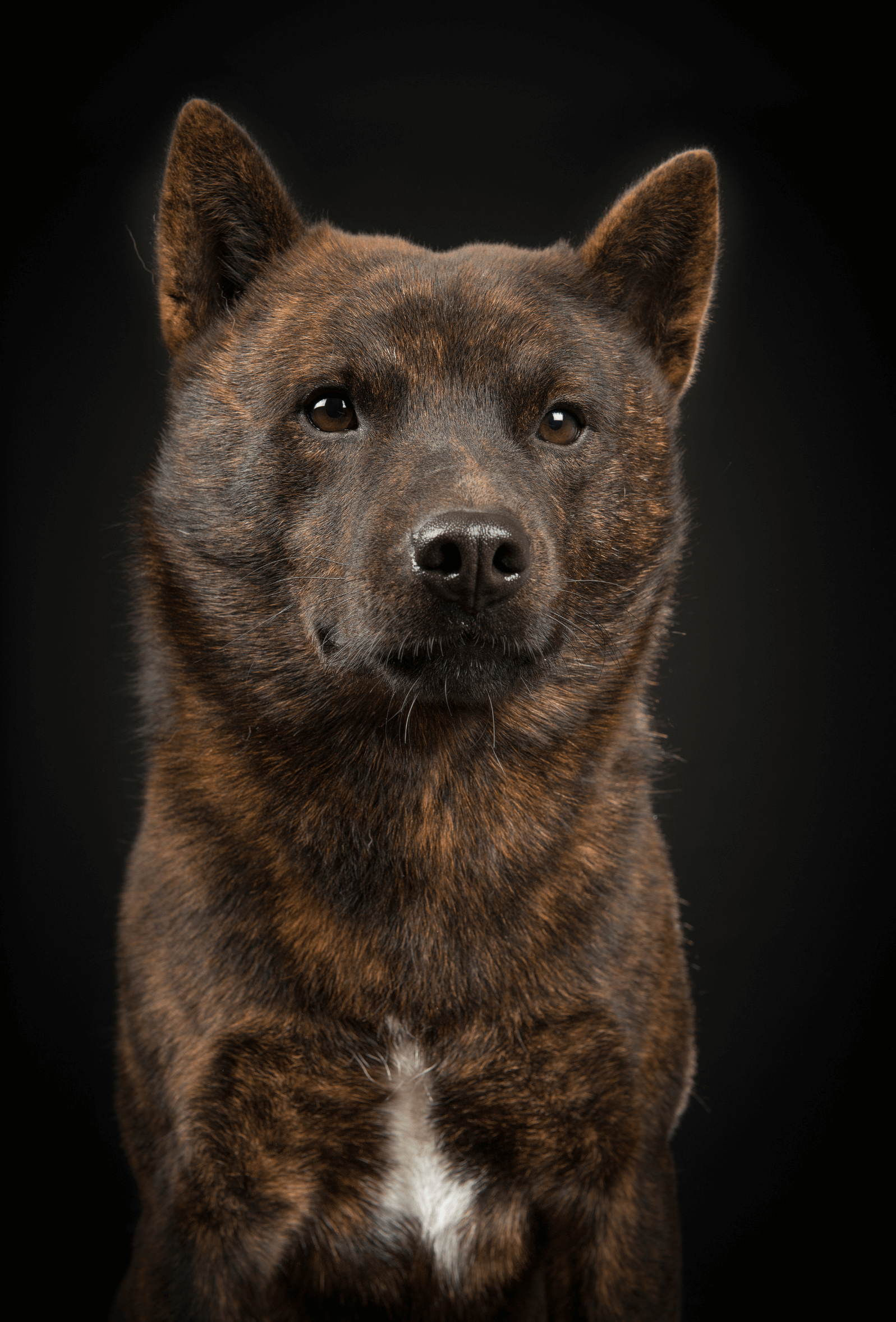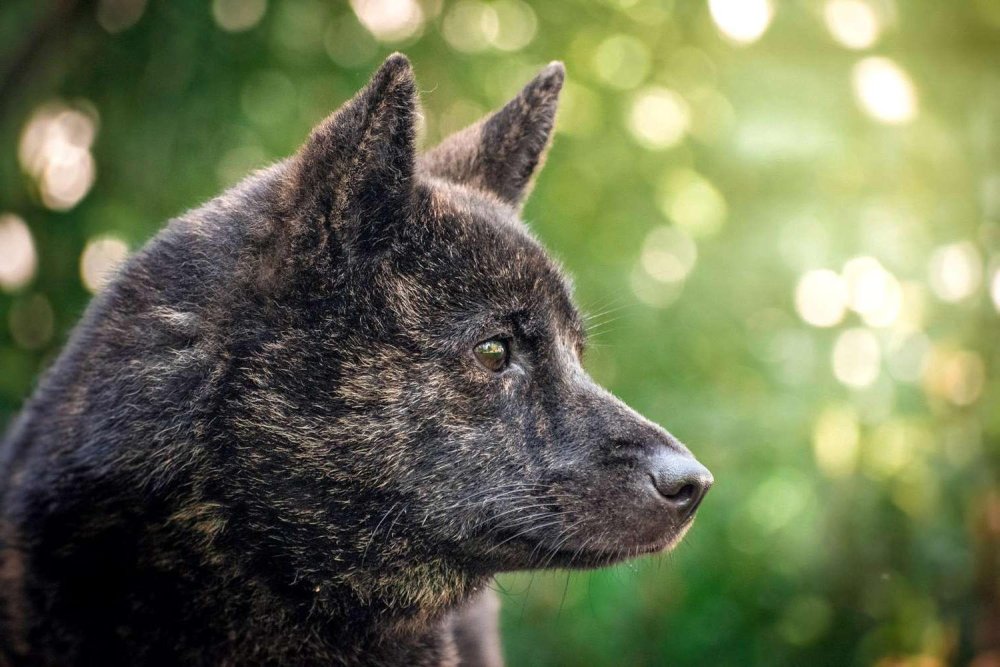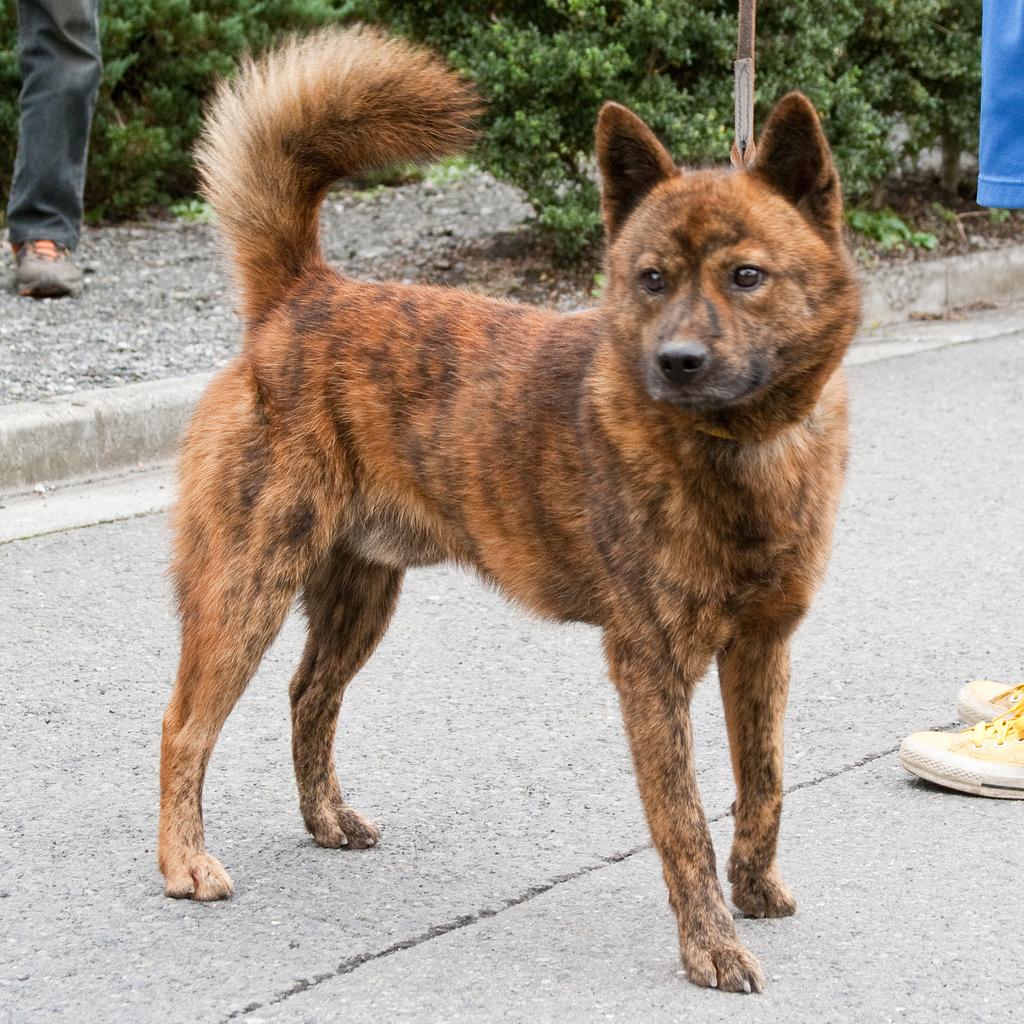- Breed Category: Working Dog
- Country of Origin: Japan
- Average Height: 45-56 cm (18-22 inches)
- Average Weight: 14-23 kg (31-50 pounds)
- Average Life Span: 12-15 years
- Grooming Requirements: Low, occasional brushing
- Exercise Requirements: High, needs daily exercise
- Coat Type: Double coat, short to medium
- Coat Color Variations: Brindle, red, black
- Shedding Level: Moderate
- Ear Type: Erect
- Tail Type: Curled over back
- Temperament: Loyal, intelligent, reserved
- Intelligence Level: High
- Barking Tendency: Low
- Compatibility with Children: Good with proper socialisation
- Compatibility with Other Pets: Varies, early socialisation needed
- Training Ease: Moderate, requires consistency
- Common Health Issues: Hip dysplasia, allergies
- Dietary Needs: High-quality dog food recommended
- Energy Level: High
- Drooling Tendency: Low
- Sensitivity to Weather: Tolerates cold, sensitive to heat
- Overall Maintenance Level: Moderate
- Original Purpose: Hunting dog
- Year of Recognition by Kennel Clubs: 1934 in Japan
- Apartment Friendly: Not ideal, needs space
- Best Suited For: Active families, rural settings
- Cost of Ownership: Moderate to high
- Unique Traits: Brindle coat, agile hunter
- Cultural Significance: National treasure of Japan
Imagine a dog that’s as rare as a Tasmanian tiger but still roams the forests of Japan. Meet the Kai Ken, a breed that’s as unique as it is fascinating. Known for its striking brindle coat and keen intelligence, the Kai Ken is a national treasure in Japan, often referred to as the “Tiger Dog” due to its distinctive markings. This article aims to delve into the breed’s characteristics, rich history, and care needs. Originating from the mountainous regions of Yamanashi Prefecture, the Kai Ken was primarily used for hunting. Its agility and natural instincts made it a favourite among hunters. Despite its ancient roots, the breed remains relatively unknown outside Japan, making it a hidden gem for dog enthusiasts.
The Kai Ken: A Glimpse into Its Origins and Characteristics

Early Development of the Breed
The Kai Ken’s story begins in the rugged mountains of Yamanashi Prefecture, where it was bred for its hunting prowess. This breed developed naturally over centuries, adapting to the challenging terrain and climate. Its keen senses and agility were honed to track and hunt game, making it an invaluable companion for local hunters.
Role in Japanese Hunting Traditions
In Japan, the Kai Ken was more than just a hunting dog; it was a vital part of the hunting culture. Known for its ability to navigate dense forests and steep mountains, the Kai Ken was used to hunt deer and boar. Its loyalty and intelligence made it a trusted partner in these traditional hunts.
Key Historical Figures and Regions
The breed’s development is closely tied to the people of Yamanashi, who valued the Kai Ken for its unique abilities. While specific historical figures are not well-documented, the breed’s preservation is credited to the dedication of local hunters and breeders who recognised its importance.
Physical Characteristics
The Kai Ken is easily recognisable by its striking brindle coat, which comes in shades of black, red, and sesame. This medium-sized dog has a well-muscled build, standing about 45 to 56 centimetres tall. Its triangular ears and curled tail add to its distinctive appearance, while its alert expression reflects its intelligence and readiness.
Appearance and Unique Traits
The Kai Ken stands out with its medium size and athletic build, making it both agile and strong. Its coat is a striking brindle pattern, often compared to a tiger’s stripes, which is why it’s affectionately called the “Tiger Dog.” The coat can vary in shades of black, red, and sesame, giving each dog a unique look. Its triangular ears and curled tail add to its distinctive appearance, while its alert eyes reflect a sharp intelligence.
Temperament and Behaviour
Known for its loyalty and intelligence, the Kai Ken is a devoted companion. It’s naturally reserved with strangers but forms strong bonds with its family. This breed is highly trainable, thanks to its keen mind and eagerness to please. While it has a calm demeanour at home, the Kai Ken thrives on physical activity and mental stimulation, making it an excellent choice for active families or individuals who enjoy outdoor adventures.
Personality Traits and Suitability as a Family Pet

Typical Personality Traits
The Kai Ken is a breed that embodies loyalty, intelligence, and agility. These dogs are incredibly devoted to their families, often forming strong bonds that last a lifetime. Their intelligence makes them quick learners, eager to pick up new commands and tricks. Agility is another hallmark of the breed, a trait that harks back to their hunting days in the rugged Japanese mountains.
Suitability as a Family Pet and Working Dog
As a family pet, the Kai Ken is a fantastic choice. They are known for their loyalty and protective nature, making them excellent companions. Their intelligence and agility also make them suitable for various working roles, from search and rescue to agility sports. This versatility is a testament to their adaptability and eagerness to work alongside humans.
Interaction with Children and Other Animals
When it comes to children, the Kai Ken is generally gentle and patient. They can be playful and protective, making them great playmates for kids. However, early socialisation is key to ensuring they interact well with other animals. With proper training, they can coexist peacefully with other pets, although their hunting instincts may sometimes come into play.
Training and Exercise Needs
The Kai Ken thrives on mental and physical challenges. Regular exercise is essential to keep them happy and healthy. They enjoy activities like hiking, running, and agility training. Their intelligence means they respond well to training, but consistency and positive reinforcement are crucial. Engaging their minds with puzzle toys or advanced training can help prevent boredom and keep them sharp.
Training, Exercise, and Health of the Kai Ken

Importance of Early Training and Socialisation
Getting a head start on training and socialisation is crucial for the Kai Ken. These dogs are naturally intelligent and eager to learn, but they can be a bit reserved with strangers. Early exposure to different people, environments, and other animals helps them grow into well-rounded adults. This foundation is key to ensuring they adapt well to various situations and become confident companions.
Recommended Training Techniques
When it comes to training, consistency and positive reinforcement work wonders with the Kai Ken. They respond well to praise and treats, making them quick learners. Keep sessions engaging and varied to hold their interest. Incorporating games and challenges can make training a fun experience for both you and your dog.
Daily Exercise Requirements and Activities They Enjoy
The Kai Ken is an active breed that thrives on daily exercise. They love activities like hiking, running, and agility courses. These dogs need both physical and mental stimulation to stay happy. Regular exercise not only keeps them fit but also helps prevent boredom, which can lead to unwanted behaviours.
Health and Lifespan
Generally healthy, the Kai Ken has a lifespan of around 12 to 15 years. Regular vet check-ups and a balanced diet are essential to maintain their well-being. Like any breed, they can be prone to certain genetic conditions, so it’s important to be aware of their health needs and provide appropriate care.
Health and Care for the Kai Ken

Common Health Issues
The Kai Ken is generally a healthy breed, but like all dogs, they can be prone to certain health issues. Hip dysplasia and allergies are among the most common concerns. Regular vet check-ups can help catch these early, ensuring your dog stays in top shape.
Average Lifespan and Health Tips
With a lifespan of 12 to 15 years, the Kai Ken can be a long-term companion. To keep them healthy, provide a balanced diet and regular exercise. Mental stimulation is just as important, so engage them with puzzle toys and training sessions.
Preventative Care Recommendations
Preventative care is key to a healthy life. Regular vaccinations, flea and tick prevention, and dental care should be part of their routine. Early socialisation and training also contribute to their overall well-being, helping them adapt to various environments.
Grooming and Maintenance
The Kai Ken’s coat is low-maintenance but benefits from regular brushing to remove loose hair and keep it looking its best. Bathing should be occasional, as over-washing can strip their coat of natural oils. Regular nail trimming and ear cleaning are also essential to prevent infections.
Coat Care and Grooming for the Kai Ken

Coat Care and Grooming Routines
The Kai Ken’s coat is a standout feature, but it requires some attention to keep it in top condition. Regular brushing is key to managing their coat, especially during shedding seasons. A good brush once or twice a week helps remove loose hair and keeps their coat looking sleek. This routine also helps distribute natural oils, promoting a healthy shine.
Shedding and Seasonal Grooming Tips
Like many breeds, the Kai Ken experiences seasonal shedding, typically in spring and autumn. During these times, more frequent brushing can help manage the extra hair. A deshedding tool can be particularly useful to tackle the undercoat. Bathing should be occasional, as over-washing can strip essential oils from their coat.
Diet and Nutrition
A balanced diet is crucial for the Kai Ken’s overall health and coat condition. High-quality dog food, rich in protein and essential fatty acids, supports their active lifestyle and keeps their coat healthy. Fresh water should always be available, and treats should be given in moderation to maintain a healthy weight.
Nutritional Needs and Feeding for the Kai Ken

Nutritional Needs for Optimal Health
Feeding your Kai Ken a balanced diet is key to their health and vitality. High-quality dog food with a good mix of protein, fats, and carbohydrates is essential. Look for foods rich in omega-3 and omega-6 fatty acids to support their coat and skin health. Fresh fruits and vegetables can also be a great addition, providing essential vitamins and minerals.
Foods to Include and Avoid
Include lean meats like chicken or fish, whole grains, and vegetables in their diet. Avoid foods high in artificial additives, preservatives, and fillers. Chocolate, onions, and grapes are toxic to dogs and should be kept out of reach.
Feeding Schedules and Portion Recommendations
Feed your Kai Ken twice a day, once in the morning and once in the evening. Portion sizes depend on their age, weight, and activity level, so consult your vet for specific recommendations. Always ensure they have access to fresh water.
Fun Facts and Trivia
Did you know the Kai Ken is one of the six native Japanese dog breeds? Their unique brindle coat is not just for looks; it helped them blend into the forest while hunting. Despite their hunting background, they are known for their gentle nature with family members.
Interesting Tidbits and Famous Kai Ken Dogs
Interesting Tidbits about the Kai Ken
The Kai Ken is a breed full of surprises. Known as one of Japan’s six native dog breeds, it stands out with its unique brindle coat, which served as natural camouflage in the dense forests. This breed is also known for its remarkable climbing ability, a trait that helped it navigate the rugged terrains of its homeland. Despite its hunting origins, the Kai Ken is known for its gentle and loyal nature, making it a beloved companion in Japanese households.
Famous Kai Ken Dogs in Media or History
While the Kai Ken may not be as widely recognised as some other breeds, it has made its mark in Japanese culture. The breed has been featured in various Japanese films and television shows, often depicted as a symbol of loyalty and bravery. One notable Kai Ken was “Shiro,” a dog that became a local hero in Japan for its role in a rescue operation, showcasing the breed’s intelligence and dedication.
Final Thoughts

The Kai Ken is a remarkable blend of tradition and loyalty. This unique breed, with its striking brindle coat and agile nature, offers both challenges and rewards for dedicated owners. As a national treasure of Japan, the Kai Ken embodies a rich history and a promising future for those willing to embrace its needs. With proper care and socialization, this “Tiger Dog” can become a cherished companion and a testament to the enduring bond between humans and dogs. Consider welcoming a Kai Ken into your life and experience the joy of this extraordinary breed.
